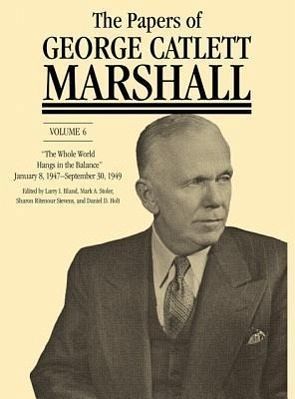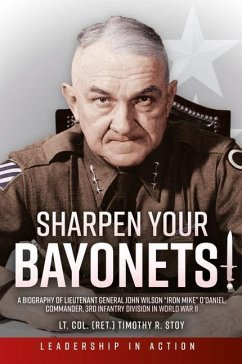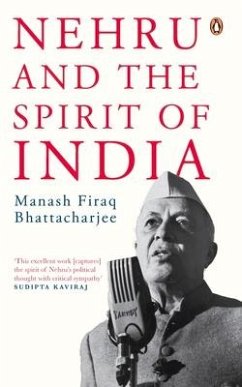Nicht lieferbar

The Papers of George Catlett Marshall
"The Whole World Hangs in the Balance," January 8, 1947-September 30, 1949 Volume 6
Herausgeber: Bland, Larry I; Holt, Daniel D; Stevens, Sharon Ritenour; Stoler, Mark A
Versandkostenfrei!
Nicht lieferbar
"The more I see and talk to him," wrote President Harry S. Truman in early 1947, "the more certain I am that he's the great one of the age. I am surely lucky to have his friendship and support." This sixth volume of The Papers of George Catlett Marshall quickly reveals why. Marshall's two years as secretary of state, from January 1947 to January 1949, remain among the most eventful in the history of both the State Department and American foreign policy in general. They include the formal break between the United States and its Soviet wartime ally and the beginning of the cold war; the enunciat...
"The more I see and talk to him," wrote President Harry S. Truman in early 1947, "the more certain I am that he's the great one of the age. I am surely lucky to have his friendship and support." This sixth volume of The Papers of George Catlett Marshall quickly reveals why. Marshall's two years as secretary of state, from January 1947 to January 1949, remain among the most eventful in the history of both the State Department and American foreign policy in general. They include the formal break between the United States and its Soviet wartime ally and the beginning of the cold war; the enunciation of such major US policies as the Truman Doctrine, containment, and the Marshall Plan; the Berlin Blockade and airlift; and the formation of what would soon become the North Atlantic Treaty Organization. Simultaneously the United States deals with civil wars in Greece and China as well as violent conflicts that accompany postwar decolonization elsewhere, most notably in India and Palestine, and the ensuing creation of the independent states of India, Pakistan, and Israel. The United Nations is in its infancy; the Rio Pact and the Organization of American States establish a new defense pact and organization with Latin America. Secretary of State Marshall played the pivotal role in this transformation of American relations with the rest of the world and in the specific policies that were established during these years. He was, of course, President Truman's key adviser in foreign affairs as well as the official who proposed the European Recovery Program. But initiating and implementing this and other US foreign policies also required attendance at a large number of important international conferences in 1947 and 1948, and an even larger number of Senate and House committee hearings. His testimony at these hearings--and his close relations with legislative leaders--proved crucial to establishing the extraordinary bipartisan Congressional approval of his proposals during these years; so were his numerous public appearances to garner broad public support for his programs. The concluding chapter in this volume covers Marshall's recovery from major surgery and retirement in 1949. He remained remarkably active during this time period, however, as his numerous speeches and other documents in the chapter make clear. And the retirement itself would be short-lived. In September President Truman appointed him to head the American Red Cross beginning October 1, and in the following year he would name Marshall secretary of defense. His papers relating to those two assignments and to his final retirement--from September 1951 to his death in October 1959--will be the subject of the seventh and final volume of The Papers of George Catlett Marshall. Also Available: Volume 1: "The Soldierly Spirit," December 1880-June 1939 edited by Larry I. Bland and Sharon R. Ritenour Volume 2: "We Cannot Delay," July 1, 1939-December 6, 1941 edited by Larry I. Bland, Sharon R. Ritenour, and Clarence E. Wunderlin Jr. Volume 3: "The Right Man for the Job," December 7, 1941-May 31, 1943 edited by Larry I. Bland and Sharon Ritenour Stevens Volume 4: "Aggressive and Determined Leadership" June 1, 1943-December 31, 1944 edited by Larry I. Bland and Sharon Ritenour Stevens Volume 5: "The Finest Soldier" January 1, 1945-January 7, 1947 edited by Larry I. Bland and Sharon Ritenour Stevens Publication of The Papers of George Catlett Marshall is supported by grants from the National Historical Publications and Records Commission and the National Endowment for the Humanities. Jacket design: Alan Carter Jacket photo: courtesy of the US Army Signal Corps












